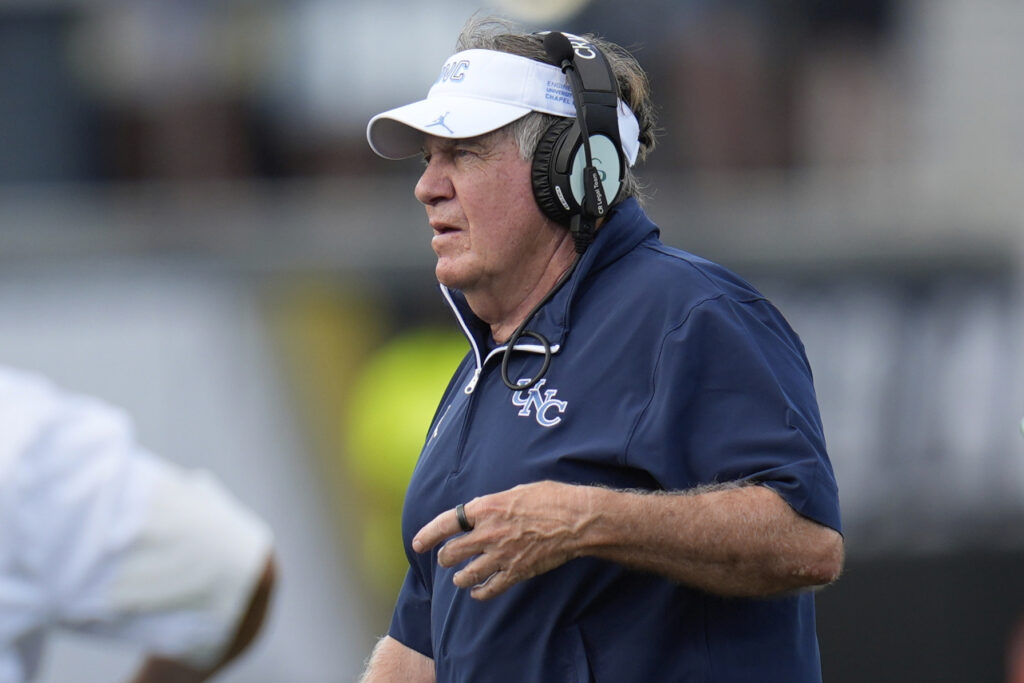Tar Heels’ Anemic Passing Game Weighing Down Belichick’s Debut
By David Glenn
One-third of the way through Bill Belichick’s first season at North Carolina, the Tar Heels have a middling 2-2 record, but a closer look at those four games uncovers more bad news than good.
UNC’s victories came against the two weakest opponents, Charlotte and Richmond, on its 12-game regular-season schedule. There are no cupcakes left on this year’s plate.
In the Tar Heels’ two games against Power Four opponents, TCU and UCF of the Big 12, they were embarrassed by 48-14 and 34-9 scores, respectively.
The starting point for Carolina’s problems this season is very simple, although many fans and even some media chose to ignore it while offering preseason forecasts of a big 2025 win total for the Tar Heels, amidst the extended afterglow of the hiring of a Hall of Fame-caliber coach.
While Belichick and his staff appear to be recruiting well for future seasons, there is simply a below-average amount of talent on hand for his collegiate debut.

North Carolina head coach Bill Belichick comes on the field during a time out in the first half of an NCAA college football game against Central Florida, Saturday, Sept. 20, 2025, in Orlando, Fla. (AP Photo/John Raoux)
If there’s a midseason silver lining from Carolina’s perspective, it’s that the team’s unusual schedule — which includes two open weeks (including this one) surrounding its Oct. 4 game against Clemson in Chapel Hill — allows for plenty of practice time and at least the possibility of significant improvement during the latter part of the season.
While the 2025 Tar Heels have myriad problems, including a subpar defensive line, it’s not difficult to identify the one area that’s holding them back most: their passing game.
Among the 68 teams that compete at the Power Four level, Carolina ranks 67th with an average of 150 passing yards per game, ahead of only Iowa.
While 150 passing yards per game would have been an incredibly productive number (seriously) in 1955, when Belichick’s father Steve was an assistant coach at UNC, times obviously have changed … and dramatically so.
Boston College leads the nation with 394 passing yards per game, and the Eagles have managed that incredibly high level of aerial production even with a redshirt sophomore quarterback, Alabama transfer Dylan Lonergan, who’s in his first year on campus.
Overall, almost 50 of the 136 teams competing at the Football Bowl Subdivision (FBS) level — including Atlantic Coast Conference members BC, Syracuse (Notre Dame QB transfer Steve Angeli), Duke (Tulane QB transfer Darian Mensah), Pittsburgh, Virginia (North Texas QB transfer Chandler Morris), SMU, NC State, Miami (Georgia QB transfer Carson Beck), Florida State (Boston College QB transfer Tommy Castellanos), Louisville (Southern Cal QB transfer Miller Moss) and Cal (true freshman QB Jaron Sagapolutele) — are averaging at least 250 passing yards per game. Most of those ACC teams, like UNC, have a new starting quarterback.
Carolina’s offense, meanwhile, has been truly anemic, primarily because of its woeful passing game.
In the Tar Heels’ season-opening loss to TCU, starting quarterback Gio Lopez completed only four of 10 passing attempts for 69 yards, no touchdowns and one interception, which the Horned Frogs returned for a score. Backup Max Johnson had much better numbers (9-for-11, 103 yards, one TD, no interceptions), but those came in garbage time, against TCU’s backups.
In Carolina’s defeat at UCF, the themes continued. Lopez (11-for-14, 87 yards, two interceptions) turned the ball over and failed to get the Tar Heels into the end zone. After a second-half injury to Lopez, Johnson (11-for-19, 67 yards, one TD, no interceptions) found wide receiver Kobe Paysour for an eight-yard score, but that came near the end of the third quarter, with the Heels trailing by an insurmountable 27-3 margin.
Moving forward, UNC’s offensive spotlight will continue to fall largely on Lopez (a redshirt sophomore whose injury is not considered season-ending) and Johnson (a sixth-year senior with previous starting experience at LSU and Texas A&M), of course, but also on first-year offensive coordinator Freddie Kitchens, one of only two holdovers from Mack Brown’s staff.
Kitchens, 50, is well-liked and respected by many UNC players and staff members (he even served as interim head coach after Brown’s dismissal and got an interview for the full-time job), but he has an incredibly thin résumé as a coordinator and play-caller.
In his entire 27-year coaching career, prior to this season, Kitchens had served as a coordinator only twice — both times (in 2018 and 2021) in the National Football League, both times in an interim capacity. His elevation to OC was, by far, Belichick’s most surprising staff decision.
Nobody would suggest that Kitchens was handed a stacked deck in terms of Carolina’s offensive personnel, but there are a lot of coordinators operating with new quarterbacks (see list above) and large-scale player turnover in the ACC this season, and each of them has managed to develop a more competent offense.
If Belichick’s first season in Chapel Hill is going to end any better than his final season in the NFL (4-13), the Tar Heels’ play-calling, clock management (a major error enabled UCF’s final first-half touchdown), QB play and overall execution all must improve significantly.
At this point, it would be downright “offensive” to suggest otherwise.
 David Glenn (DavidGlennShow.com, @DavidGlennShow) is an award-winning author, broadcaster, editor, entrepreneur, publisher, speaker, writer and university lecturer (now at UNC Wilmington) who has covered sports in North Carolina since 1987.
David Glenn (DavidGlennShow.com, @DavidGlennShow) is an award-winning author, broadcaster, editor, entrepreneur, publisher, speaker, writer and university lecturer (now at UNC Wilmington) who has covered sports in North Carolina since 1987.
Chapelboro.com does not charge subscription fees, and you can directly support our efforts in local journalism here. Want more of what you see on Chapelboro? Let us bring free local news and community information to you by signing up for our newsletter.


